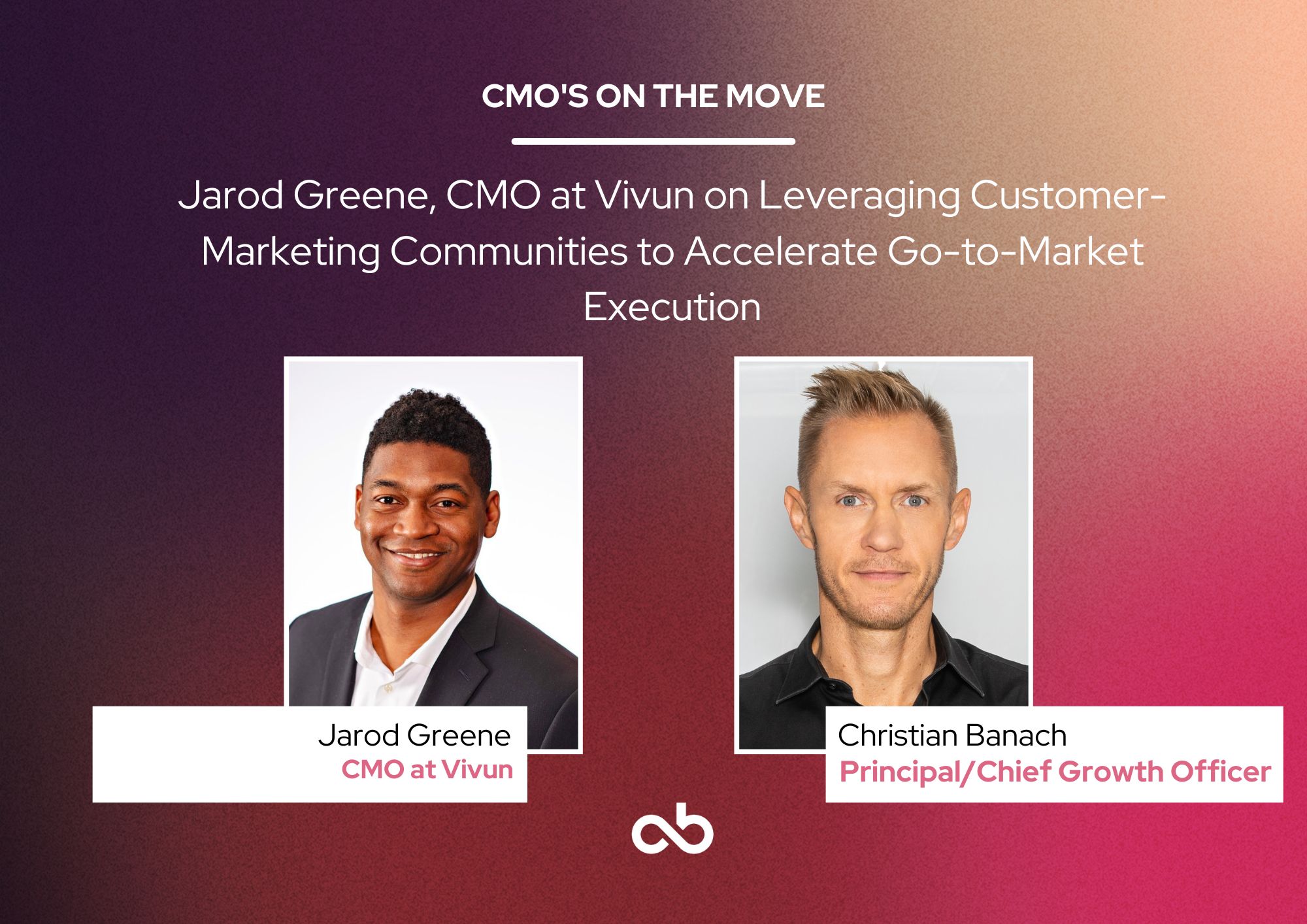/ Executive Interviews
Jarod Greene, CMO at Vivun on Leveraging Customer-Marketing Communities to Accelerate Go-to-Market Execution
By: Christian Banach



A leading provider of AI-powered pre-sale software, Vivun, recently appointed Jarod Greene CMO. Greene is an accomplished tech industry veteran who brings a unique blend of experiences to his role. He started his career answering calls at Gartner and worked his way up to becoming a research director, then honing his marketing acumen at Cherwell Software, Optio, and Highspot.
Christian Banach sat down with Greene to discuss how to shape effective go-to-market strategies and build meaningful customer relationships.
Where to find Jarod Greene: LinkedIn
Where to find Christian Banach: LinkedIn
Christian:
Walk us through your early life, your education, and any defining moments that really shaped who you are today.
Jarod:
My mother is a librarian, so a lot of my childhood was spent locked in a library. I really fell in love with the idea that “all the information you need is around you.” The ability to tap into a book, a knowledge source, and find what you need was always something that drew me in.
In my early days, I was a substitute math teacher, and the ability to make complex topics make sense to seventh graders has just kind of stayed with me throughout my career.
Christian:
Your career seems to have taken off at Gartner, where you started in the research department. Tell us about that experience and how it led you down this path.

Jarod:
I found a job at Gartner as a contact center support analyst—the job was literally answering the phone and directing calls.
Sometimes I get calls from angry VC types. They assumed that they had access to the Gartner research because they had paid Gartner for some subscription at some point. And they would call; you could tell they were on a deadline. They needed market share data and forecast information.
And then I realized I had access to all of this data. I started reading and consuming it. From there, I was able to start routing calls and connecting customers to analysts based on all the knowledge I had built.
Christian:
I read a LinkedIn post that you recently made about coaching your daughter’s little league team. I have experienced doing the same thing with my daughter. I’m curious about your perspective on how the experience of coaching her team has translated into your corporate life.
Jarod:
I believe we all need good coaches. I’ve been blessed to have had great coaches throughout my life, both in athletics and in professional and industry settings. I’ve always had people who have taken the time to give me insight, advice, or just pearls of wisdom that have made me better.
The other coaches and I want the girls to get better. We want the girls to have fun. And whether they play for us or another team, we just want them to keep going and growing
Christian:
Let’s dive into your present role. For those who don’t know about Vivun, what do you guys do?
Jarod:
Vivun is a pre-sales platform. When I say pre-sales, I mean your most technical sales engineer or solution consultant. And it’s a platform that gives them the tools to operate efficiently, automate some of the demos they need to scale, and then drive seamless collaboration with both sales and product teams.
I’ve always worked well as a product marketer with solution consultants, technical sales teams, and sales engineers. They get the intersection of the product and the go-to-market.
I’m really excited to be a part of what we do at Vivun, which is just to empower presales to impact the product and go-to-market strategy in a whole new way.
Christian:
This is your debut as a CMO. What are some of the key responsibilities that you’re in charge of now? And how are you finding it only a few weeks into the role?
Jarod:
So much of the early work is focused on establishing role clarity. We’re a smaller team, but that’s fun because we get to control the end-to-end pieces. It’s about strong product marketing—everything from value propositioning to launch to competitive pricing, packaging, and personas.
There’s the demand pillar, which I’m excited to now own and drive. We’re working to make sure that when we think about the campaign, workflows, lead flow, and the opportunity to make sure that the database is clean to drive demand from some of our higher-performing channels.
Then there’s making sure that we have the right messaging position, which makes our ability to scale and create demand a heck of a lot easier.
And then there’s this third kind of pillar that we’ve worked a lot with, which is really about customers and community.
It’s the whole life cycle of making sure customers have the tools to drive usage expansion, be satisfied, and ultimately stay with your product for life.
Christian:
I would love to hear a little bit more about your idea of the customer marketing community. Do you have any additional ideas on how you’re going about that?
Jarod:
When you think about community-led and customer-led, there’s an angle that when you have underserved communities—we can think of pre-sales as one—you can probably tap into hundreds, if not thousands, of folks in this role who have a point of view on how a technical sales process should run.
I’m keen on making sure that their voice is heard and that their point of view is recognized, and why not use it as a flywheel to accelerate the development of our product and the execution of our go-to-market strategy?
Christian:
Where do you see the tech sector going from a marketing perspective? Where do you see things changing and evolving?
Jarod:
Generative AI is all the rage, right? I think I saw a Gartner prediction that said something in the realm of over 30% of marketing messages and hooks will be synthetically produced. And I think as we all kind of understand our use cases around generative AI, it’s not so much to use it to create all of our content as to scale our ability to do it quickly.
I see marketing playing a bigger role in the broader enablement of change—I absolutely see the remit going beyond just demand generation, product marketing, customer service, and operations to kind of broader ownership of things that extend well beyond our brand.
Banach:
Tell me about your internal marketing team. What does it look like? Are you looking to expand that team now?
Jarod:
Our team is now working on product marketing—positioning, messaging and enablement. I very much believe in a world where enablement is a change agent.
We’re also working to make sure we have a clean, healthy, CRM database—the ability to make sure that leads and opportunities get routed the right way.
I’m looking to grow the marketing team. In the future, we want more highly specialized roles around some of the nuanced activities we do.
Field marketing is a phenomenal example of a discipline that I’ve learned a lot about and seen the impact of. We absolutely would love to scale those things.
We are just now in a moment that says, “how do we build as much pipeline within our TAM (total addressable market) as possible and ensure that the field can close those leads in a way that makes sense?” And that will allow us to get to a place where more revenue means more opportunities.
Banach:
Where might external agencies come into the mix here? Are you working with any right now?
Jarod:
Agencies allow us to augment our own skills in a way where if we don’t have the skills, the tools, or the resources to do it, we will. I’ve had conversations in just the last five weeks and am looking to dry ink with a few more on ways to create content at scale. I absolutely look to agencies to help us do that.
We use agencies to tap into communities that we don’t have access to. And we get them to drive the influence and change the response in ways we want.
Banach:
How do you find the agencies that you work with? Is there a certain process?
Jarod:
I mix it up sometimes, but the most common path is my own network. Who’s worked with whom, who’s seen results of value, and who would vouch for you? So if someone’s looking to get to me, it’s probably going to be through my network with someone I know, trust, and have worked with. And it’s one of the faster ways to get it done.
Banach and Greene discussed more about Greene’s early years and the Eddie Murphy-as-marketer 90s movie Boomerang, more of how coaching influences his experiences in sales, and the way to find relevant current marketing insights. You can see more of the interview here.
Sign up now! Every Monday, get breaking news of recent CMO appointments, motivation to start your week positively, and innovative business development insights.